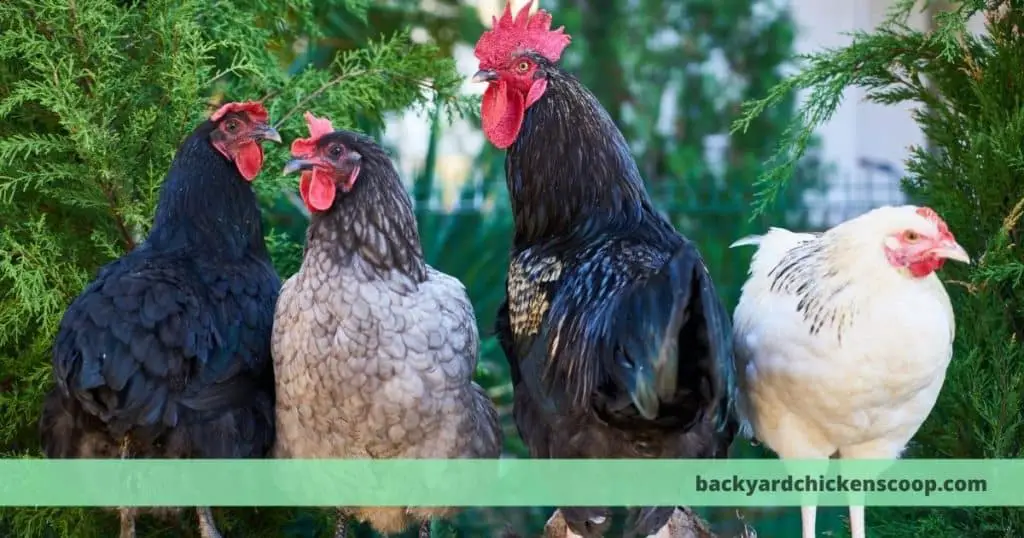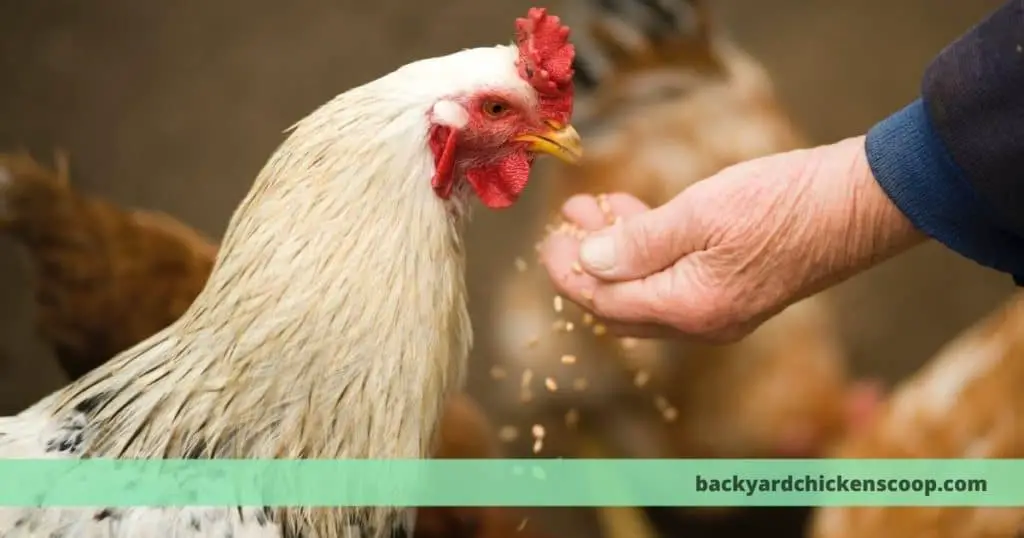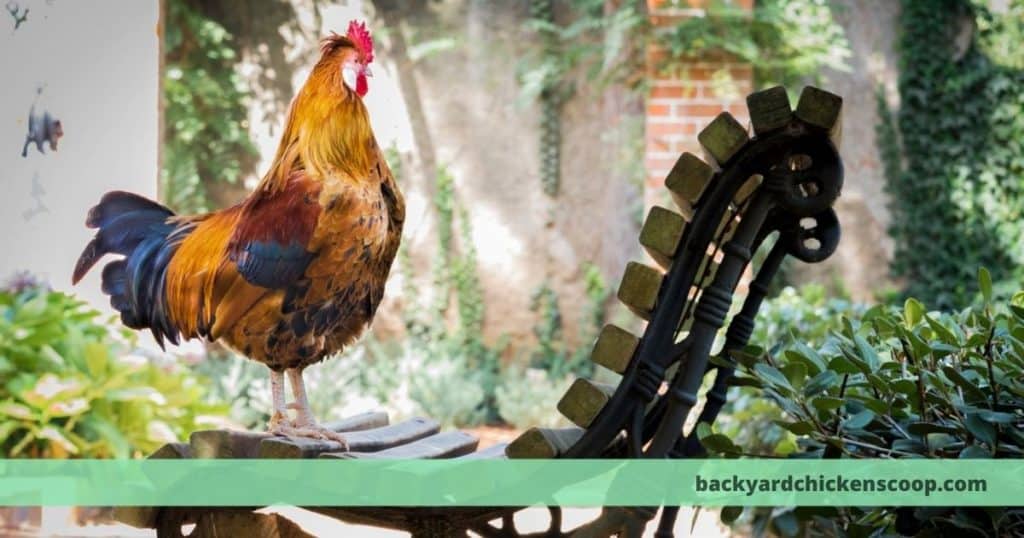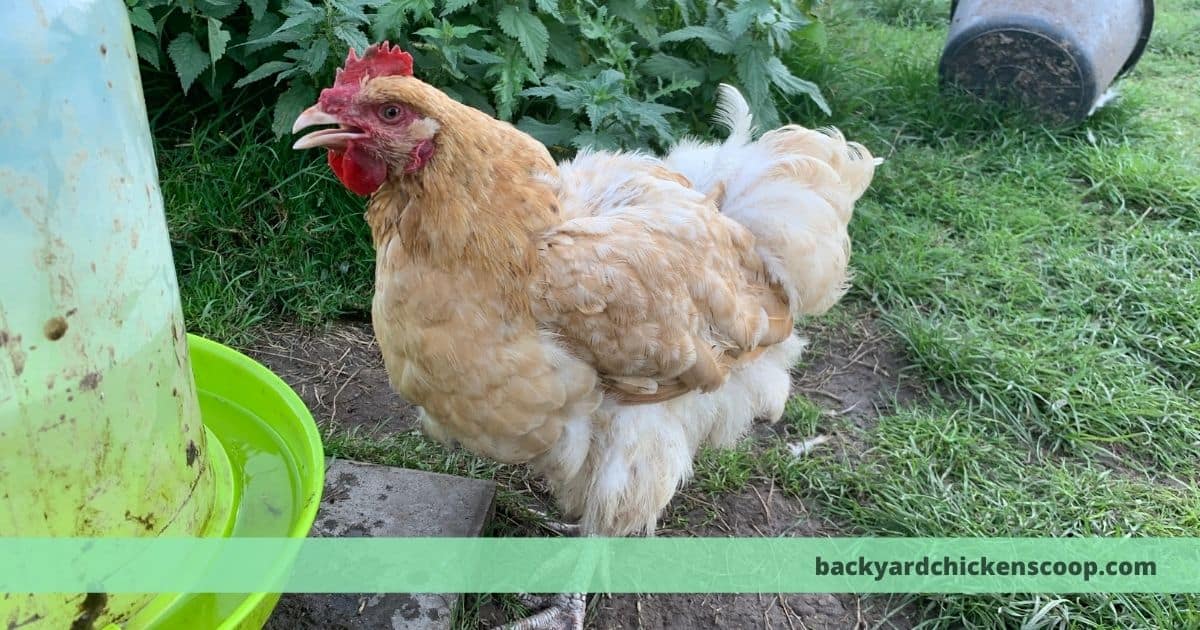As a vet, I’ve always found chickens to be particularly challenging as they don’t display symptoms very predominantly. One of the visible symptoms, though, are gagging motions.
So here’s a short introduction to why your chickens might be display gagging motions.
Why is my chicken making gagging motions?
Hens, chicks, and roosters are known to do their fair share of head-bobbing other movements. But perhaps recently, you’ve noticed more unusual behaviour in which your chicken appears to be gagging or shuffling her head back and forth.
This movement may look different from the typical stride we see in poultry. You might even worry that your chicken is sick. Fortunately, that’s not usually the case, but let’s take a look at the top causes (and remedies) for gagging motions in chickens.
1. Rearranging the Crop
The most common reason for gagging motions is merely your chicken rearranging its crop. If you’re new to keeping chickens, the crop is a small pouch in which stores food before sending it to the stomach.
Inside the crop, digestive enzymes begin breaking down the feed and preparing it for the GI system to digest. Because the crop contains a number of dry components or large chunks of feed, things often get stuck or need to be manoeuvred around.
This is a regular occurrence in all poultry. To rearrange the crop, chickens will bob their head in a gagging motion to settle the contents within.
2. Issues with the crop
While this behaviour is quite common, you might notice if it’s happening excessively or if your chicken seems to be in distress. This could point to the possibility of the impaction of your chicken’s crop.
Impaction might occur if something in the crop is stuck, or more typically that the chicken has ingested a foreign object (such as hay or nesting material). Checking your chicken’s crop for impaction is easy. Simply feel along the neck, below the oesophagus, and look for fullness or swelling near the crop area.
If you have reason to think your chicken’s crop is impacted, you can gently massage this area to help the chicken pass the mass. If your chicken is displaying more serious symptoms, such as lethargy, vomiting, or lack of droppings, it might need more serious treatment.
You should always isolate an ill bird from the rest of the flock, and keep an eye on its symptoms.
Some people have suggested adding magnesium citrate to your chicken’s water to help condition the GI tract and soothe the crop, just as humans take it for digestive issues. However, if the mass in question is too large, your hen will require surgery. You’ll be glad to know that this surgery is relatively straightforward, and should cause minimal harm to your chicken.
A significantly large obstruction or history of the impacted crop can run the risk of stretching out the muscle, which is called a “pendulous crop.” You should always consult your veterinarian and have him or she examine the bird before beginning any treatment regimes.

3. Other crop issues
Your chicken’s gagging motions may also be the result of a “sour crop,” or a bacterial bloom in the muscle preventing emptying and digestion. A sour crop has a noticeably foul smell, and like an impacted crop, will feel swollen.
When feeling for a sour crop, expect it to be softer and “malleable,” sometimes referred to as mushy. You can also gently massage a sour crop to help the chicken pass any blockage, but be warned that it might be tender. If you notice any other symptoms, such as beak discharge, diarrhoea, or lethargy, your chicken might have a more serious infection that will require more aggressive treatment.
A sour crop can have multiple causes, including anything from worms to injury, and even as a side effect of antibiotics. Antibiotics can disrupt the bacterial balance in the crop and cause bad bacteria to bloom. You might consider adjusting your chicken’s intake of these.
Monitoring your chicken’s health
Gagging motions are effectively harmless, and rarely a sign of anything more critical. Chickens clear their crops daily, so seeing this motion shouldn’t be an immediate sign of concern. The only time you should be concerned is if the chicken is displaying any other symptoms or looks generally unwell.
One good way to rule outcrop issues is to inspect each of your chickens’ crops in the morning. You can massage small masses as needed, which will prevent larger masses from accumulating.
Chickens and behavioural issues
What if your chicken is making a gagging motion, but its crop is empty? This is a documented phenomenon among chicken keepers, and given that there are no other serious symptoms, there are a few potential theories as to why. If you don’t keep roosters, you might be surprised to know that when roosters make their infamously loud crow, their ear holes close shut when the beak opens.
This is an evolutionary mechanism to protect the rooster’s hearing from its own crow (perhaps someday, humans will be able to do this too!). Accordingly, farmers have observed roosters, hens, and (more often) chicks to make a sort of gagging motion in response to loud sounds or stimuli.
Whether this is an involuntary reaction or the equivalent of a chicken sticking her fingers in her ears, it seems to be a relatively harmless behaviour. You could even venture as to making a loud sound and seeing if this behaviour repeats itself to determine if it’s the cause.

Anecdotal observations
Another instance in which chickens make gagging motions, some keepers have observed, is in response to other stimuli. Most notably, this is the result of the farmer’s breath or a gust of wind. This ticklish sensation causes the chicken to bob its head, perhaps similar to how humans get goosebumps.
Again, it could also be the chicken trying to close its ear holes. If your chicken only makes a gagging motion when you’re nearby or holding it, this could also be the reason.
Watch to see if symptoms persist
If you notice one chicken making gagging motions, be sure to keep an eye on other members of the flock as well. One less common cause of crop impaction and head bobbing could be worms. Worms are especially common in poultry, but in some cases, if they grow too quickly, they can cut off the connection between the crop and the intestines and prevent it from emptying.
Worms can also partially obstruct the crop, not causing a blockage but rather making the crop empty slowly. You should establish a regime to prevent worms and parasitic infections in your flock.
Traditionally, people add apple cider vinegar in low doses to the chickens’ water, and this is believed to help diminish the presence of worms. Other farmers have found success with garlic, as well as other medical alternatives available from your vet or supply store that prevent worm eggs from hatching in faeces.

More and uncommon situations
Other uncommon situations causing this behaviour in chickens could include internal growths, parasites, pendulous crops, and more. If you have any suspicion that something might be wrong with your chicken, don’t hesitate to get the advice of a licensed vet or experienced handler.
Not only can they help rule out more serious illnesses, but they can administer medication or even perform surgery if necessary. Hopefully, however, they will be able to tell you that your chicken’s behaviour is normal and simply a reaction to the world around them.
Prevention
To rule out any serious illnesses that could be causing your chicken making gagging motions, you should establish a proper care routine. That means checking daily for crop health, in the mornings and not at night. The reason for this is that chickens tend to fill their crop before bed (don’t we all love a midnight snack?) and digest it throughout the night.
Add small quantities of apple cider vinegar to your water to prevent worms and other parasitic infections, and make sure that clean water is available at all times. Water can be a breeding ground for worms and bad bacteria, and ensuring that freshwater is available can prevent many health problems in your chickens.
As some have observed, Sour Crop can occur after your chicken drinks from a standing puddle or contaminated water source. Don’t forget to replace the water supply after rainfall and get rid of any puddles that might accrue in the yard.
After you check your chicken’s crop in the morning, do a sweep of the coop and yard to ensure that no foreign material is laying around that your chickens might be tempted to eat. Finally, take care to ensure that the grasses your chickens feed on are small and digestible.
Thicker or longer grasses are almost always the cause of an impacted crop and are also one of the most easily preventable things you can take care of. These examples of daily maintenance can help rule out any serious issues when observing new behaviours in your chickens.
Your feathered friends
While people have been keeping chickens for centuries, few people understand how vibrant and fascinating these feathered friends can be. Chicken owners are just like dog and cat owners. We take special care to ensure our flock is happy and healthy.
More often than not, a chicken making gagging motions is something of no concern. Some of the more serious potential causes might be worrying to read about, but it’s beneficial to know the anatomy of poultry and how things can get out of sync.
With a better understanding of your chicken’s overall health, you can ensure that she will be happy for years to come.
Further Reading
- Operating on an impacted crop: https://www.greenwillowhomestead.com/blog/how-to-operate-on-your-chickens-impacted-crop
- What is sour crop?: https://www.thehappychickencoop.com/sour-crop/
- Symptoms of impacted crop: http://www.poultrydvm.com/condition/impacted-crop


